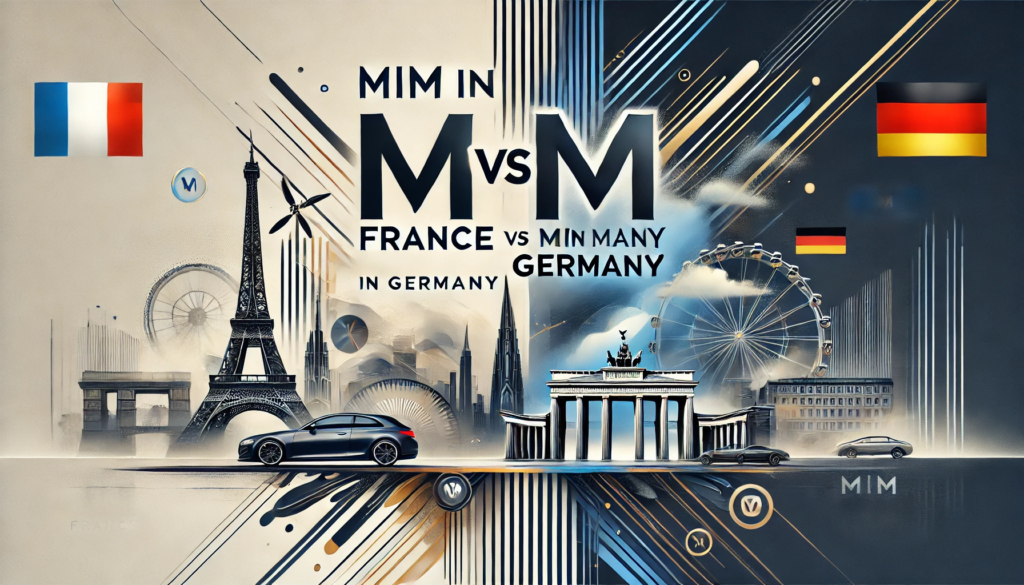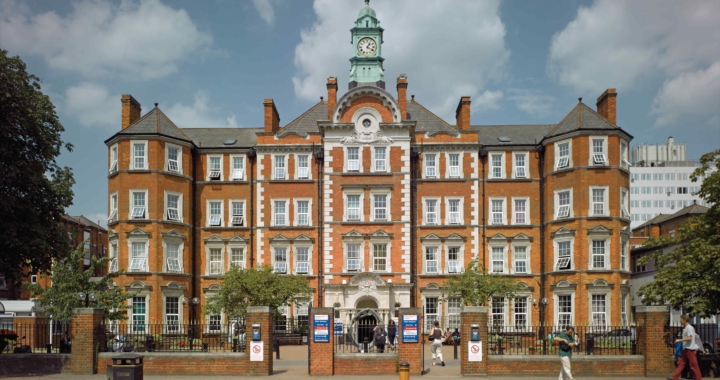When it comes to pursuing a Master in Management (MiM), two European giants—MiM in France vs MiM in Germany stand out as preferred destinations. Known for their world-class institutions, innovative teaching methods, and strong industry connections, both countries offer exceptional opportunities for international students. However, while they share some commonalities, the differences in admission requirements, costs, job prospects, and post-study work options can play a decisive role in shaping your choice.
This blog will walk you through these key differences, backed by facts, figures, and actionable insights, ensuring you make an informed decision about your MiM journey – MiM in France vs MiM in Germany.
Difference #1: Admission Requirements

MiM in France: Rigorous Yet Structured Admissions Process
French MiM programs are often associated with the prestigious Grande Écoles, including institutions like HEC Paris, ESSEC Business School, and ESCP Business School. These schools maintain a high standard for admissions, typically requiring applicants to submit GMAT or TAGE-MAGE scores. While some schools may accept applications without these scores, having a competitive score significantly enhances your chances.
The admissions process in France often involves multiple rounds, including essays, personal statements, and rigorous interview stages. Many programs are offered entirely in English, catering to international students, but having a basic understanding of French can be advantageous—not just socially, but also for internships and part-time job opportunities.
MiM in Germany: Structured and Transparent Application Cycles
In Germany, MiM programs are offered by both public universities and private business schools, with top names including WHU – Otto Beisheim School of Management, ESMT Berlin, and Mannheim Business School. Public universities often have more standardized admission requirements, whereas private institutions may have additional prerequisites.
While a GMAT or GRE score is not always mandatory, especially in public universities, private business schools often require it. Language is less of a barrier in German MiM programs, as many are taught entirely in English. However, proficiency in German can be a significant advantage when seeking internships or full-time employment after graduation. Germany follows strict application timelines, with intakes primarily in winter (October) and summer (April) semesters. Missing these deadlines could mean waiting for an entire academic year.
Key Takeaway: Flexibility vs Structure
The French system, particularly in Grande Écoles, emphasizes holistic assessments with multiple stages, while German universities operate on more rigid timelines. Both approaches have their strengths, but your preparation timeline and profile will play a significant role in determining which aligns better with your goals.
Difference #2: Average Salaries After Graduation

MiM Salaries in France: Strong ROI with Global Appeal
Graduates from French MiM programs enjoy competitive salaries, with starting packages typically ranging between €35,000 and €45,000 per year. For students graduating from top-tier schools like HEC Paris or ESSEC, this figure often surpasses the €50,000 mark.
The sectors most welcoming to MiM graduates in France include luxury management, finance, and consulting. Paris, being the financial hub of France, hosts many global firms, including BNP Paribas, Société Générale, and consulting giants like McKinsey and BCG. The French job market is also characterized by strong alumni networks, particularly within the Grande Écoles system, where connections often lead to lucrative job offers.
MiM Salaries in Germany: Higher Average Pay in Specialized Industries
Germany offers slightly higher average starting salaries for MiM graduates, with entry-level packages ranging between €40,000 and €50,000 per year. This difference can largely be attributed to Germany’s robust industrial economy, which values technical and managerial expertise equally. Cities like Munich, Frankfurt, and Berlin are key employment hubs. In Munich, the automotive sector, led by companies like BMW and Volkswagen, dominates the hiring scene. Frankfurt remains a stronghold for finance, while Berlin is rapidly becoming Europe’s startup capital, offering exciting opportunities for management professionals in tech and innovation-driven industries.
A Comparative Look: Salaries and Industries
While France offers excellent opportunities in global sectors like luxury goods and finance, Germany stands out for its emphasis on industrial management and engineering-oriented roles. Your choice will depend on whether you prefer the glamour of the luxury sector or the precision of Germany’s engineering and finance industries.
Difference #3: Program Fees & Funding

MiM Program Costs in France: A Range of Opportunities
The cost of studying a MiM in France varies significantly based on whether you choose a Grande École or a public university. For Grande Écoles like HEC Paris, ESSEC, or ESCP, tuition fees typically range between €10,000 and €25,000 per year. These institutions justify their costs with unparalleled faculty expertise, global alumni networks, and extensive corporate partnerships.
On the other hand, France’s public universities offer more affordable education. For EU/EEA students, tuition fees are often subsidized and can be as low as €243 per year. However, international students from non-EU countries might face slightly higher fees, though they remain considerably lower than those at private institutions. Funding Opportunities: France offers several scholarship options, including the Eiffel Excellence Scholarship and region-specific funding programs. Additionally, some Grande Écoles have merit-based scholarships that can cover up to 50% of tuition fees.
Living expenses in cities like Paris can be relatively high, with monthly costs averaging €1,200–€1,500, including accommodation, transport, and daily expenses.
MiM Program Costs in Germany: Affordable Yet Competitive
Germany is renowned for offering high-quality education at minimal or no tuition costs, especially in public universities. Most public universities charge only semester administration fees, ranging between €150 and €350 per semester. However, private business schools, such as WHU or ESMT Berlin, charge tuition fees ranging from €15,000 to €30,000 per year.
Scholarships are widely available in Germany, with the DAAD (Deutscher Akademischer Austauschdienst) offering funding options specifically for international students. Additionally, private institutions often have their own merit-based scholarship programs. In terms of living expenses, Germany is slightly more affordable than France. Cities like Berlin and Frankfurt have average monthly costs of around €1,000–€1,200, while smaller cities may cost even less.
Key Takeaway: Cost vs Value
If affordability is your primary concern, Germany’s public universities offer unbeatable value. However, France’s prestigious Grande Écoles, despite higher costs, provide an unmatched global reputation and strong alumni networks. The choice boils down to your financial planning and career objectives.
Difference #4: Job Opportunities & Post-Study Work (PSW)
Frustrated with Generic College Lists from AI Tools?
Get a tailored college shortlist crafted by study abroad experts who understand YOUR goals, profile, and aspirations.

Job Market in France: Diverse and Dynamic
France offers a vibrant job market for MiM graduates, with thriving industries such as luxury goods, finance, and consulting. Cities like Paris, Lyon, and Marseille serve as business hubs, hosting multinational corporations and consulting firms.
Graduates can apply for the APS (Autorisation Provisoire de Séjour), which allows them to stay in France for 12–24 months after graduation to seek employment. However, proficiency in the French language often becomes a decisive factor in securing local roles, particularly in traditional industries and government-linked organizations. France’s extensive alumni networks, particularly from institutions like HEC Paris and ESSEC, often play a crucial role in job placements.
Job Market in Germany: Innovation Meets Stability
Germany’s job market is known for its emphasis on engineering, automotive, finance, and tech industries. Cities like Munich, Frankfurt, and Berlin offer a mix of established corporations and dynamic startups.
Post-graduation, students are eligible for an 18-month residence permit, allowing them to stay in Germany and search for jobs. While many roles are available in English-speaking environments, proficiency in German significantly improves employability and career growth prospects. Germany’s robust economy and relatively lower unemployment rates also make it an attractive destination for international MiM graduates.
Employment Statistics and Insights
- In France, around 90% of MiM graduates secure employment within 3–6 months after graduation.
- In Germany, the employment rate for MiM graduates stands at 95% within 6 months of program completion.
Salaries are relatively comparable, but industry focus differs: while France thrives in luxury and finance, Germany excels in automotive and engineering sectors.
Key Takeaway: Industry Focus Shapes Opportunities
Both countries offer strong post-study work prospects, but your choice depends on your career preferences. If your goal aligns with luxury goods or finance, France might be the better option. For those interested in engineering-driven industries, automotive, or startups, Germany stands out as the ideal choice.
Difference #5: Global Value & Recognition
Reputation of French MiM Programs: Tradition Meets Global Prestige
France has long been a global leader in management education, with its prestigious Grande Écoles setting the benchmark for excellence. Institutions such as HEC Paris, ESSEC Business School, and ESCP Business School consistently rank among the top MiM programs worldwide in publications like the Financial Times Global MiM Rankings.
Graduates from these schools often enjoy unmatched global recognition, particularly in sectors such as luxury management, finance, and consulting. French MiM programs also emphasize international exposure, with many offering dual degrees, global internships, and study-abroad opportunities. The alumni networks of these schools are another key strength. Institutions like HEC Paris have extensive alumni networks in leadership roles across the globe, ensuring strong career support for fresh graduates.
Reputation of German MiM Programs: Practical and Industry-Oriented
Germany’s MiM programs, offered by institutions such as WHU – Otto Beisheim School of Management, ESMT Berlin, and Mannheim Business School, are highly regarded for their practical approach and strong industry ties. German business schools are known for blending theoretical management education with industry-relevant skills, ensuring graduates are well-prepared for dynamic business environments. These programs also emphasize STEM integration, making them particularly appealing for students interested in engineering-management hybrid roles.
While German MiM programs may not always feature as prominently in global rankings as their French counterparts, they are widely recognized for their technical precision, emphasis on ROI, and close connections with industry giants like BMW, Volkswagen, and Deutsche Bank.
Where MiM is More Popular and Why
In France, MiM programs have a stronghold due to their historic reputation and the global appeal of the Grande École system. Employers in finance, consulting, and luxury industries often favor graduates from French schools for their polished managerial training and soft skills. In Germany, MiM programs are gaining traction due to the country’s industrial strength and practical education system. The focus on combining management principles with technical expertise makes German MiM graduates highly sought after, especially in sectors like automotive, finance, and tech startups.
Key Takeaway: Prestige vs Practicality
French MiM programs shine with their global recognition and alumni networks, while German MiM programs stand out for their industry integration and technical focus. Your choice should depend on whether you value prestige and networking (France) or industry alignment and practicality (Germany).
FAQs About MiM in France vs MiM in Germany
1. Is French or German Language Mandatory for MiM Programs?
While most MiM programs in both France and Germany are offered in English, proficiency in the local language can significantly enhance your overall experience and post-graduation opportunities. In France, knowing French can give you an edge when applying for internships and local job roles, especially in industries like luxury management and finance, where fluency in French is often preferred. Similarly, in Germany, while English is widely spoken in corporate environments, German language skills can open up additional opportunities in sectors such as automotive, finance, and engineering, where many roles still require interaction with German-speaking stakeholders.
2. Which Country is More Affordable for MiM Programs?
Germany is generally considered the more affordable option for pursuing an MiM degree, primarily due to its public university system, where tuition fees are either minimal or non-existent. Even at private German business schools like WHU or ESMT Berlin, tuition fees, although higher, often offer substantial value given the program’s ROI. In contrast, MiM programs in France, particularly at prestigious Grande Écoles like HEC Paris or ESSEC, tend to have higher tuition fees, typically ranging between €10,000 and €25,000 per year. However, France offers several generous scholarship options, such as the Eiffel Excellence Scholarship, which can significantly reduce the financial burden.
3. What Are the Post-Study Work Visa Policies?
Both France and Germany have favorable post-study work visa policies for international students. In France, graduates can apply for the APS (Autorisation Provisoire de Séjour), which grants them a 12–24 month window to stay in the country and search for employment. During this time, they can freely explore job opportunities across different industries. Germany, on the other hand, offers an 18-month residence permit to MiM graduates, allowing them to stay in the country and look for work after completing their program. Both countries have policies that make transitioning from student status to full-time employment relatively smooth.
4. Which Country Offers Better Job Opportunities for MiM Graduates?
Both France and Germany offer excellent job prospects for MiM graduates, but the nature of these opportunities varies. In France, the job market is particularly strong in sectors such as luxury management, finance, and consulting, with global corporations like LVMH, BNP Paribas, and McKinsey playing a prominent role in hiring graduates from Grande Écoles. Paris remains the central hub for corporate opportunities. In contrast, Germany is renowned for its engineering-driven economy and strong corporate culture, with industries like automotive, finance, and tech startups driving employment.
5. Which Country’s MiM Degree Has Better Global Recognition?
In terms of global recognition, French MiM programs, particularly from Grande Écoles, enjoy a slightly higher prestige worldwide, frequently securing top positions in global MiM rankings by publications like the Financial Times. Graduates from schools like HEC Paris, ESSEC, and ESCP often benefit from strong alumni networks and extensive connections in global industries. Germany’s MiM programs, while slightly newer on the global stage, are gaining prominence, especially due to their practical approach, industry integration, and strong presence in technical and engineering sectors. If your career goals align with luxury management or consulting, France might be the better choice. If you’re drawn towards industrial management, engineering, or finance, Germany offers unparalleled opportunities.
Conclusion
Choosing between an MiM in France and an MiM in Germany is not just about comparing numbers or rankings—it’s about aligning your choice with your career goals, financial capacity, and personal aspirations.
In France, the emphasis is on prestigious Grande Écoles, globally recognized for their alumni networks, strong corporate connections, and dominance in sectors such as luxury management, finance, and consulting. While tuition fees might be higher, scholarships like the Eiffel Excellence Scholarship can significantly reduce financial pressure. The post-study work visa policies and the professional opportunities in cities like Paris make it an ideal destination for students aiming to thrive in globally connected industries.
In Germany, affordability takes center stage, especially with public universities offering world-class education at minimal or no tuition costs. German MiM programs are deeply rooted in practical learning, with strong ties to industries like automotive, engineering, and technology. Graduates benefit from the 18-month post-study work visa, and cities like Munich, Berlin, and Frankfurt offer abundant opportunities for career growth in both corporate giants and innovative startups.
Ultimately, if your focus is on global prestige, alumni connections, and sectors like luxury or finance, France might be the better choice. However, if you value affordability, industry integration, and strong technical connections, Germany emerges as the frontrunner. Your choice of destination isn’t just about where you study—it’s about where you see your future taking shape. Take the time to evaluate your priorities, research your target schools, and align your decision with your long-term goals. Whichever path you choose, both France and Germany promise exceptional academic experiences and rewarding career opportunities.




